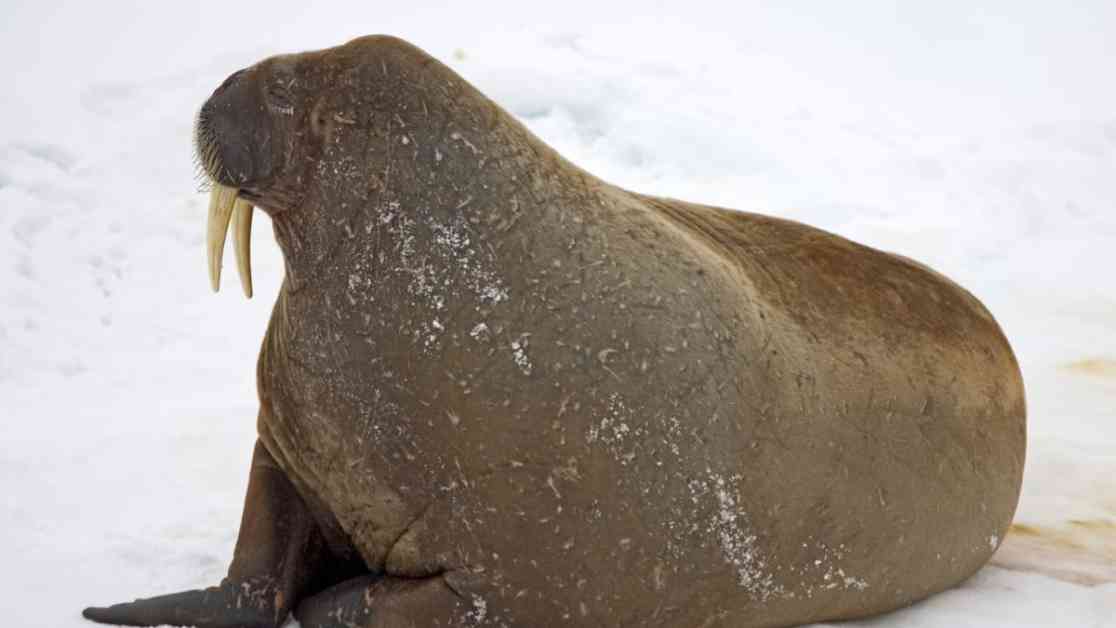In a groundbreaking discovery, scientists have unearthed a previously unknown marine mammal species, Ontocetus posti, that lived 2.2 million years ago. Led by Dr. Mathieu Boisville from the University of Tsukuba, this finding provides fresh insights into the evolutionary history of walruses and the impact of environmental changes on marine life. The fossil remains of Ontocetus posti were found in Norwich, UK, and Antwerp, Belgium, and were initially misidentified before unique features distinguishing it from its relatives were revealed.
Newly Identified Species with Unique Traits
Ontocetus posti, the newly identified species, exhibits several notable traits that set it apart from other marine mammals. These traits include four post-canine teeth, a larger lower canine, and a short, fused mandibular symphysis. These features suggest that Ontocetus posti was a suction-feeder, similar to modern walruses. Dr. Boisville highlights that this discovery showcases convergent evolution, where different species develop similar traits in response to similar environmental pressures.
Insights into Migration and Adaptation
The presence of Ontocetus posti in the North Atlantic sheds light on a fascinating migration story. It is believed that Ontocetus originated in the North Pacific Ocean and migrated to the Atlantic via the now-closed Central American Seaway. As the climate cooled and the seaway closed during the Late Pliocene, significant environmental changes occurred, likely contributing to the extinction of Ontocetus posti by the Early Pleistocene. This extinction ultimately paved the way for the modern walrus, Odobenus rosmarus, which now inhabits the Arctic.
Significance of the Discovery for Evolutionary Studies
The discovery of Ontocetus posti holds significant importance for understanding the evolution of walruses and the impacts of past environmental changes on marine mammals. It underscores how species adapt to shifting climates and provides valuable insights into how current and future climate changes might affect marine life. The study of extinct species like Ontocetus posti helps to refine our knowledge of marine mammal evolution and informs conservation efforts for existing species.
Exploring Future Research Directions
This groundbreaking discovery opens up new avenues for research into pinnipeds, which include seals, sea lions, and walruses. Future studies may delve into other Pleistocene deposits to uncover more about the diversity of marine mammals during that era. Each new discovery enriches our understanding of the history of life in the oceans, offering valuable clues to both past and present marine ecosystems.
Impact of Environmental Changes on Marine Life
The discovery of Ontocetus posti provides valuable insights into how environmental changes have influenced marine life over millions of years. By studying the evolutionary history of marine mammals like walruses, scientists can better understand how past climate shifts have shaped the diversity and distribution of species. This knowledge is essential for predicting how current and future climate changes may impact marine ecosystems and the species that inhabit them.
Conservation Implications
Understanding the evolutionary history of marine mammals through discoveries like Ontocetus posti can inform conservation efforts aimed at protecting existing species. By recognizing how past environmental changes have affected marine life, conservationists can develop strategies to mitigate the impacts of current threats, such as habitat loss, pollution, and climate change. Preserving the diversity of marine mammal species is crucial for maintaining the health and balance of ocean ecosystems.
Future Prospects in Marine Mammal Research
The discovery of Ontocetus posti has opened up exciting possibilities for further research in the field of marine mammalogy. Scientists can use this finding as a springboard to explore other ancient marine mammal species and uncover more about their evolutionary history. By studying the fossil record and genetic relationships of marine mammals, researchers can continue to expand our knowledge of these fascinating creatures and the environments they once inhabited.
In conclusion, the discovery of Ontocetus posti represents a significant milestone in the study of marine mammal evolution. This ancient walrus-like mammal provides valuable insights into the adaptive strategies of marine species in response to environmental changes. By understanding the evolutionary history of marine mammals, scientists can better predict how current and future climate shifts may impact marine life and inform conservation efforts to protect these vital species.













